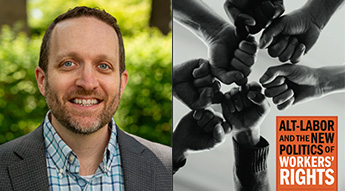Daniel Galvin
Professor of Political Science
IPR Fellow and Chair of IPR’s Program on Policy Discourse and Decision Making | Director of the Workplace Justice Lab @ Northwestern
PhD, Political Science, Yale University
Daniel J. Galvin is a Professor of Political Science, a Faculty Fellow at the Institute for Policy Research at Northwestern University, and Director of the Workplace Justice Lab @ NU.
His current research focuses on labor policy and politics, worker organizations, and the enforcement of labor standards. His latest book, Alt-Labor and the New Politics of Workers’ Rights (New York: Russell Sage Foundation, 2024) examines the changing nature of workers’ rights over the last half-century and the political development of “alt-labor” groups (nonunion, nonprofit worker organizations), which are supporting and organizing predominantly low-wage immigrant workers and workers of color in their fight for their rights in the political and economic arenas. He also researches and writes on presidential politics, political parties, and American political development. Galvin is the author of Presidential Party Building: Dwight D. Eisenhower to George W. Bush (Princeton University Press), co-editor of Rethinking Political Institutions: The Art of the State (NYU Press), and has published numerous journal articles and book chapters.
His work has been recognized with several awards, including the Emerging Scholar Award from the American Political Science Association (APSA) section on Political Organizations and Parties, the Mary Parker Follett best article prize from the APSA Politics and History section (for “From Labor Law to Employment Law: the Changing Politics of Workers’ Rights”), and the Best Paper Award from the APSA Public Policy section (for “Deterring Wage Theft: Alt-Labor, State Politics, and the Policy Determinants of Minimum Wage Noncompliance”). His research has been supported by the Russell Sage Foundation, the Washington Center for Equitable Growth, the Economic Policy Institute, the National Science Foundation, the AT&T Research Fellowship, the Miller Center for Public Affairs, the LBJ Foundation, and the Dwight D. Eisenhower Foundation. His teaching has been recognized by the E. LeRoy Hall Award for Excellence in Teaching and the R. Barry Farrell Teaching Award, and he was twice elected by the Northwestern student body to the Faculty Honor Roll.
Galvin is currently chair of the Policy Discourse and Decision Making program and affiliated with the Race, Poverty, and Inequality program at the Institute of Policy Research. He is also affiliated with the Comparative-Historical Social Science (CHSS) program and the Center for the Study of Diversity and Democracy (CSDD) at Northwestern.
Current Research
The New Politics of Workers’ Rights. Over the last several decades, as national labor law has “ossified” and precarious, nonstandard, bad jobs have proliferated, a growing number of workers – disproportionately low-wage immigrants, women, and people of color – have become increasingly vulnerable to exploitation and abuse in the workplace. In response, a new politics of workers’ rights has begun to emerge in new venues (state and local levels), focusing on new governing institutions (employment laws), and featuring new organizational forms (worker centers and other “alt-labor” groups), coalitions (including traditional labor unions, community groups, and social movements), and strategies (including innovative efforts to build political power for low-wage workers and their communities). These developments have resulted in new substantive rights and protections for workers and have helped to invigorate the labor movement, But at the same time, they have added new problems without resolving the problems produced by labor law’s drift in the first place. In Alt-Labor and the New Politics of Workers’ Rights, Galvin uses original quantitative and qualitative data to analyze the new policy innovations and document and assess the political development of alt-labor groups over the first two decades of the 21st century.
Powers and Practices in Labor Standards Enforcement. Despite a booming economy, wage theft remains a widespread problem. Worker advocates have responded by pushing for stronger laws to create deterrence and incentivize compliance with wage-hour laws. Having such laws “on the books,” however, may not be enough to compel compliance. As many scholars and observers have noted, state departments of labor often fail to conduct vigorous enforcement. This raises an empirical question: to what extent do state enforcement agencies make sure of their statutory powers and what are the implications for wage theft? This paper draws upon a novel national survey of state departments of labor, new data measuring the strength of state minimum wage laws, and state-by-state estimates of minimum wage violations to answer these questions. Galvin and coauthors find that many states do not do what they can legally do, and tellingly, when we account for both powers and practices in examining rates of minimum wage violations, enforcement practices are more strongly correlated with a lower incidence of wage theft than powers alone. However, when we interact the two measures, the association of each with minimum wage violations is found to be contingent on the other: when statutory authority is minimal, enforcement practices have little effect. But, perhaps more surprisingly, when enforcement practices are minimal, statutory authority is ineffective as well. Only when a state has both strong statutory powers and vigorous enforcement do we see a statistically significant and substantively meaningful decline in the minimum wage violation rate. Galvin and coauthors draw upon these findings to call for a new research agenda into the misalignment between statutory powers and enforcement practices.
Workplace Justice Lab@Northwestern University. The WJL@NU conducts research on workers’ rights and economic inequality and collaborates with local, state, and federal government agencies as well as worker centers, unions, and legal nonprofits. WJL@NU is part of a multi-institutional partnership that is anchored by the Workplace Justice Lab @ Rutgers University and includes the Pilipino Workers Center of Southern California. WJL runs two programs: (1) Beyond the Bill, which addresses the challenge of labor standards enforcement at all levels of government and (2) Build the Base, Grow the Movement, which supports learning and experimentation around a distributed organizing model for worker justice organizations and unions to expand their membership bases and grow their leadership teams.
Selected Publications
Books
Galvin, D. 2024. Alt-Labor and the New Politics of Workers’ Rights. New York: Russell Sage Foundation.
Galvin, D. 2010. Presidential Party Building: Dwight D. Eisenhower to George W. Bush. Princeton, N.J.: Princeton University Press.
Galvin, D., with Ian Shapiro and Stephen Skowronek, eds. 2006. Rethinking Political Institutions: The Art of the State. New York: NYU Press.
Articles and Book Chapters
Galvin, D. and C. Thurston. 2022. APD as a problem-driven enterprise. Studies in American Political Development 36(2):156–8.
Tsoukalas, A., J. Round, J. Fine, and D. Galvin. 2022. Minimum wage enforcement: The unfinished business of Florida’s constitutional amendment. Florida Journal of Law and Public Policy 32(3): 463–90.
Fine, J., D. Galvin, J. Round, and H. Shepherd. 2021. Wage theft in a recession: Unemployment, labor violations, and enforcement strategies for difficult times. International Journal of Comparative Labour Law & Industrial Relations 37(2): 107–32.
Galvin, D. and J. Seawright. 2021. Surprising causes: Propensity-adjusted treatment scores for multimethod case selection. Sociological Methods and Research 52(4): 1632–80.
Galvin, D. 2020. Labor’s legacy: The construction of subnational work regulation. ILR Review 74(5): 1103–31.
Galvin. D. and J. Hacker. 2020. The political effects of policy drift: Policy stalemate and American political development. Studies in American Political Development 34(2): 216–38.
Galvin, D. 2020. Party domination and base mobilization: Donald Trump and Republican Party building in a polarized era. The Forum: A Journal of Applied Research in Contemporary Politics 18(2): 135–68.
Galvin, D. 2019. From labor law to employment law: The changing politics of workers’ rights. Studies in American Political Development 33(1): 50–86.
Galvin, D. 2019. Let’s not conflate APD with political history, and other reflections on ‘causal inference and American political development.’ Public Choice 185: 485–500. https://doi.org/10.1007/s11127-019-00695-3.
Galvin, D. 2017. The "changing of the guard" from labor law to employment law. Labor Studies Journal 42(3): 255–60.
Galvin, D. 2016. Deterring wage theft: Alt-labor, state politics, and the policy determinants of minimum wage compliance. Perspectives on Politics 14(2): 324–50.
Popular Writings
Galvin, D. and J. Vincent. 2021. “Democratic presidents have traditionally hurt their parties. Joe Biden may be different.” The Washington Post – Monkey Cage, January 21.
Galvin, D., D. Schlozman, and S. Rosenfeld. 2020. “What Happened to that ‘Blue Wave’?” The Washington Post – Monkey Cage, November 10.
Galvin. D., J. Fine, J. Round, and H. Shepherd. 2020. Maintaining Effective U.S. Labor Standards Enforcement Through the Coronavirus Recession. Washington Center for Equitable Growth, September.


